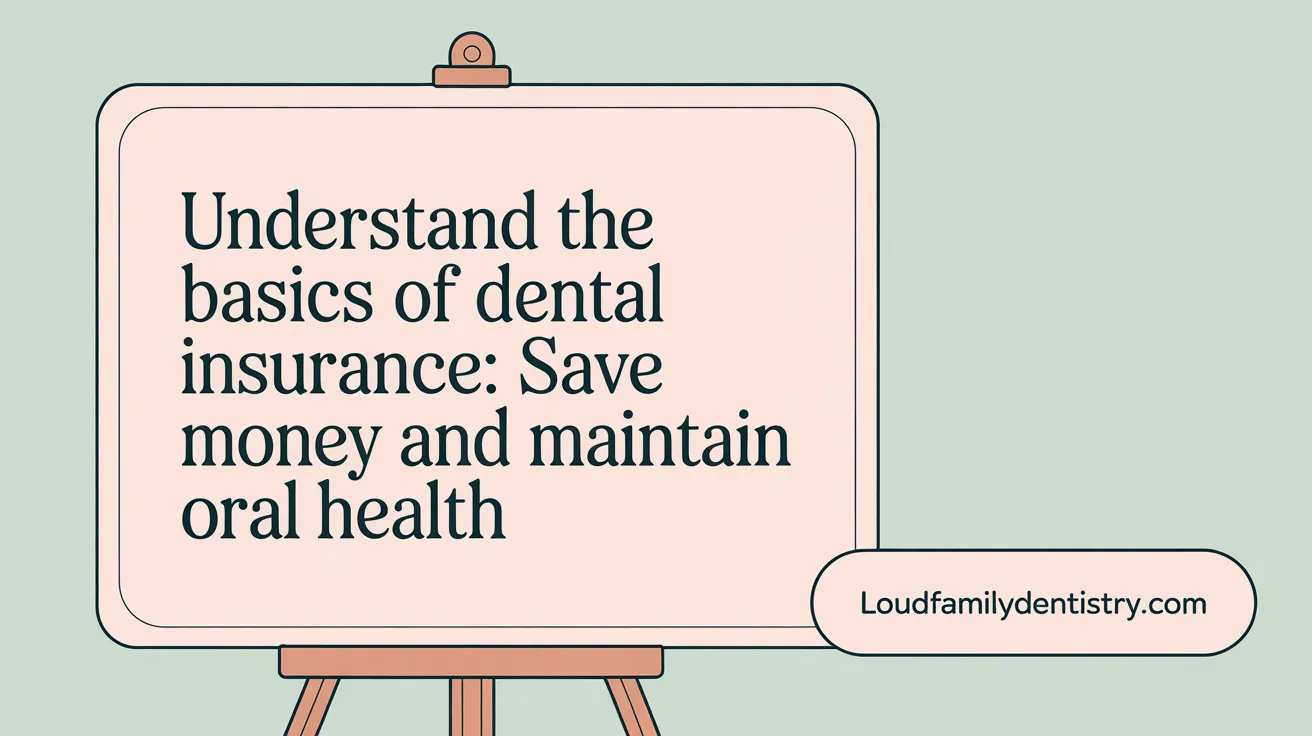The Importance of Understanding Your Dental Insurance
Dental insurance can be a vital tool for maintaining your oral health while managing costs. However, understanding how dental insurance works and how to strategically use it is essential to maximize the benefits and avoid unnecessary expenses. This article explores everything from how dental insurance functions, the variety of coverage options, to practical strategies that help you get the most value from your plan at Loud Family Dental.
How Dental Insurance Works: The Basics You Should Know

How does dental insurance work?
Dental insurance helps reduce the cost of dental care by covering a portion of treatments ranging from routine check-ups to complex procedures. When you have a dental plan, you pay a monthly premium to keep your coverage active. Additional costs might include deductibles, which are amounts you pay out of pocket before coverage kicks in; copays, the fixed amounts paid for specific services; and coinsurance, where you share costs with the insurer after meeting your deductible.
Coverage is generally divided into three tiers: preventive, basic, and major care. Preventive services such as exams, cleanings, fluoride treatments, and x-rays are usually fully covered, often at 100%. Basic services like fillings and simple extractions are reimbursed at around 70–80%. Major treatments, including crowns, bridges, and oral surgery, are typically covered at roughly 50%.
Your insurance plan also includes an annual maximum benefit, which is the maximum amount your insurer will pay within a calendar year. To maximize benefits, it’s best to use your coverage wisely by scheduling preventive visits early and understanding your provider network. Many plans require treatments to be performed by in-network dentists, which often results in lower costs.
Waiting periods can apply for some procedures, meaning coverage will only begin after a certain time from the start of the policy. Finally, when you undergo treatment, claims are filed either by your provider or directly by you if out-of-network. Understanding these basics ensures you make informed decisions to protect both your oral health and your finances.
Exploring Coverage Options: Understanding Different Dental Plans and Categories

What are the different coverage options and categories in dental insurance plans?
Dental insurance plans are designed to cover various aspects of oral health care, helping reduce out-of-pocket costs for patients. Most plans are categorized into four main types:
- Preferred Provider Organization (PPO): These plans provide broad access to a network of contracted dentists. Patients can see out-of-network providers but at higher costs. PPOs typically offer flexibility and extensive coverage for preventive, basic, and major treatments.
- Dental Health Maintenance Organization (DHMO or HMO): HMO plans require patients to use in-network dentists. They usually have lower premiums and minimal copays but less flexibility in choosing providers. Coverage focuses on preventive care and limited coverage for more complex procedures.
- Indemnity Plans: These plans offer the most flexibility, allowing patients to choose any dentist. The insurance reimburses a percentage of the costs, which can be convenient for those seeking specific providers or treatments.
- Discount or Savings Plans: These are not traditional insurance but membership programs that offer discounted rates at participating dental offices. They provide cost savings on various dental treatments without coverage limits typically associated with insurance.
Coverage levels vary based on the plan type, often including preventive services, basic restorative care like fillings, and major treatments such as crowns and orthodontics. Understanding these categories helps patients select a plan that best fits their oral health needs and financial situation.
Choosing the Right Dental Insurance Plan for Your Needs

How can I choose the right dental insurance plan for my needs?
Selecting the ideal dental insurance plan involves understanding different plan types and evaluating how they fit your personal or family dental health needs. There are primarily four types of plans to consider: Dental HMO (Health Maintenance Organization), PPO (Preferred Provider Organization), indemnity plans, and discount dental plans. Each has its own structure, network restrictions, and coverage options.
First, identify your dental care requirements. Make a list of routine procedures you might need regularly, such as exams and cleanings, and more extensive treatments, like crowns or orthodontics. Then, compare how plans cover these services, paying special attention to premiums, deductibles, annual maximums, and any exclusions.
Network size is also crucial. Choosing a plan with a broad network or one that includes your preferred dentist can save money and streamline claims. For example, in-network providers often have negotiated rates, reducing your out-of-pocket expenses.
Review any extras provided by the plan—like discounts on cosmetic procedures or dental products—and consider how easy it is to access customer support and manage claims. Reading plan details carefully and asking questions to providers can help clarify benefits.
Balancing coverage, cost, flexibility, and service quality will guide you to a plan that best meets your expectations and ensures your dental health is well-maintained without unnecessary expenses.
Strategies to Effectively Utilize and Maximize Your Dental Insurance Benefits

What strategies can help me effectively utilize my dental insurance benefits?
Maximizing dental insurance benefits requires a proactive approach to your dental care planning. Begin by prioritizing preventive treatments such as exams, cleanings, and fluoride applications, which are typically covered at 100%. Regular visits not only maintain oral health but also catch potential issues early, saving money and discomfort later.
Tracking your annual maximum is crucial. Most plans set a yearly limit—once reached, additional treatments will be out-of-pocket until the benefit resets. To make the most of this, schedule necessary procedures early in your coverage year, often starting January 1st, to utilize your full benefit. If you have larger treatments like crowns or root canals planned, consider initiating or completing them within the current year if coverage is available.
For minor issues such as cavities or chipped teeth, addressing them promptly prevents escalation into more complex and costly procedures. This approach helps preserve your dental health and financial resources.
Choosing in-network providers is a strategic move to reduce costs. In-network dentists have negotiated rates with your insurance, and they often handle claims directly, simplifying the process.
Planning your major treatments carefully across different benefit years can also be advantageous. Spreading out costly procedures over multiple years can help maximize each year's coverage and manage out-of-pocket expenses.
Another valuable strategy involves leveraging Flexible Spending Accounts (FSAs) or Health Savings Accounts (HSAs). These accounts allow tax-free payments for dental care, further reducing your overall costs.
Lastly, if you are caring for multiple family members, coordinate appointments and treatments to optimize their combined annual benefits. Scheduling treatments early and efficiently managing appointments ensures you get the most value from your dental insurance plan.
Cost-Saving Tips and Financial Advantages of Dental Insurance
How can understanding plan details help me save money?
Knowing your dental insurance policy is crucial for maximizing its benefits. Focus on understanding coverage percentages for various procedures—preventive care is often covered at 100%, basic services like fillings at 70-80%, and major treatments at around 50%. Be aware of your annual maximum benefit, which limits how much your plan will pay each year. Also, understand if your plan has deductibles or waiting periods, which can affect when and how treatments are covered.
Why is scheduling preventive services early important?
Routine checkups, cleanings, and exams are typically fully covered and help catch issues early. Regular visits prevent small problems from becoming expensive, complex treatments. Scheduling these early in the year ensures you maximize your insurance benefits before the annual maximum resets on January 1st.
How should I plan major treatments to get the most coverage?
Timing is vital. Beginning major treatments like crowns or root canals at the start of your plan year allows you to use the full benefit amount. If needed, consider splitting treatments over multiple years, starting early in the year or just before benefits reset. This strategy helps you avoid paying full price out-of-pocket.
What financial strategies can I use beyond insurance?
Using flexible spending accounts (FSAs or HSAs) helps you pay for dental care with tax-free dollars. Negotiating directly with your dental provider or considering discount or membership plans can also lower costs. These approaches, combined with a good insurance plan, can significantly reduce your overall dental expenses.
Are comparison shopping and alternative plans beneficial?
Absolutely. Comparing different insurance plans—including traditional PPOs, HMOs, and discount plans—can reveal options with better coverage or lower premiums. Discount dental plans often offer reduced rates on procedures and are a good supplement if your existing insurance is limited.
How do I prevent benefits from expiring?
Most plans operate on a 'use it or lose it' basis and reset on January 1st. Planning treatments early in the year or before the year's end maximizes your benefits. Booking appointments ahead of holidays and busy seasons ensures you don’t miss out on available coverage.
What role can dental providers play in maximizing benefits?
Your dentist or dental office staff can help clarify your insurance coverage, submit claims, and suggest treatment options that align with your benefits. Don’t hesitate to ask for assistance—they can often help identify opportunities to save money and ensure you make the most of your insurance plan.
Making the Most of Your Dental Insurance at Loud Family Dental
Understanding and maximizing your dental insurance benefits is crucial for maintaining optimal oral health while managing costs effectively. By learning how your plan works, selecting the right coverage, and applying savvy strategies such as timely preventive care and smart scheduling, you can fully utilize the financial advantages your insurance provides. At Loud Family Dental, our team is ready to assist you in navigating your dental benefits and ensuring you gain the most value from your plan. Regular dental care coupled with informed insurance use leads to healthier smiles and better financial peace of mind.
References
- Understanding Dental Insurance: Maximizing Your Benefits
- Understanding and Maximizing Your Dental Insurance ...
- 3 Ways to Maximize Your Dental Insurance in 2022
- Maximizing Your Dental Benefits: Getting the Most from ...
- Understanding Dental Benefits
- Maximizing Your Dental Plan: 5 Essential Tips | PRACTICE
- 5 Smart Ways To Max Out Your Dental Insurance Benefits
- Affordable Dental Care: 7 Proven Ways to Save Money
- 6 Tips to Help Make the Most of Your Dental Insurance
- How Much Is Dental Insurance?
